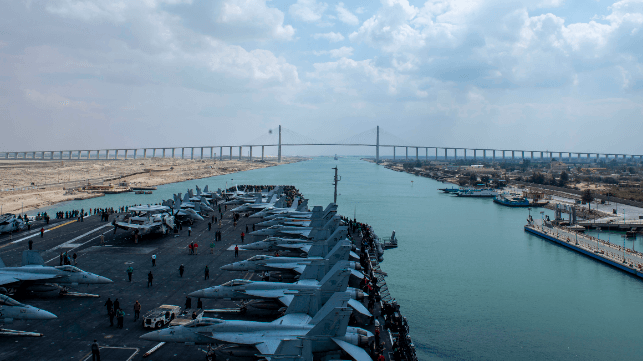Trump Demands Free Transits for U.S. Ships on Suez Canal

On Saturday, U.S. President Donald Trump called for the Suez Canal and the Panama Canal to provide no-cost transits for all U.S. naval and merchant vessels. The remarks on Panama reflect his previous statements, but this is the first time that Trump has made equivalent demands about access to the Suez Canal.
In a social media post, Trump claimed that the French- and Egyptian-built Suez Canal "would not exist without the United States of America," and said that he has instructed Secretary of State Marco Rubio to "immediately take care of, and memorialize, this situation." The remarks drew outrage from Egypt's political class - but not its rulers, who have remained quiet.
The Suez Canal was built by French diplomat Ferdinand de Lesseps' Compagnie Universelle du Canal Maritime de Suez during the period of the U.S. Civil War, supported by participation from international shareholders. The privately-funded work started in 1859, and it initially depended upon forced labor. Despite the warnings of naysayers, and a substantial number of casualties during construction, the canal opened in late 1869 and was an immediate commercial success. It passed into British hands in 1882, and British troops defended it from attack until Egypt nationalized it in 1956. Under the current Egyptian administration, it has been widened and expanded, with new parallel channels for two-way traffic.
According to Al Jazeera, U.S. traffic accounts for about 10-20 percent of the volume on the Suez Canal, and generates fees of $400-700,000 per vessel traffic for the Egyptian government's Suez Canal Authority. Waiving these fees would be a significant blow to the SCA's already-reduced finances.
Egyptian commentators have expressed surprise at Trump's demand, and have questioned whether the canal's existence depended on the U.S., given its French, British and Egyptian operating history.
"[Egypt] refused the presence of any military bases from the Americans and before them the Russians," said Egyptian member of parliament Mahmoud Badr in a social media statement. "The Suez Canal was built by Egyptians with their blood, nationalized by Egyptians, and is protected by the Egyptian army."
Egypt's Civil Democratic Movement, which includes several of the country's political opposition parties, accused Trump of "a lack of historical awareness and unacceptable arrogance."
"The Egyptian people consider the Suez Canal a red line and will never accept any infringement on Egypt's sovereignty and national security," the group said in a statement. "They will follow in the footsteps of their fathers and grandfathers in defending their nation's freedom and territorial integrity."
Red Sea security
Over the course of the past year, the Suez Canal's traffic levels have fallen drastically due to the Houthi threat in the Red Sea. The militant group carried out more than 100 attacks and caused two sinkings off Yemen in 2024; merchant shipping is now taking a cautious approach to the Suez route, and traffic on the canal has fallen by 60 percent since 2023.

that matters most
Get the latest maritime news delivered to your inbox daily.
The Houthis' stated objective - a Gaza ceasefire - briefly occurred with U.S. support in January; Israel ended that ceasefire in March, and the U.S. has turned to an intensive campaign of airstrikes to suppress the Houthis' capacity to interfere with shipping. If successful, this campaign would benefit Egypt and the Suez Canal.
While the Houthis' operational tempo has fallen, the group still has the ability to launch drones and missiles - for now, focused on U.S. Navy and Israeli targets. Merchant shipping traffic levels remain low in the Red Sea, and most top shipping companies have said that they would wait until long after hostilities have ended before bringing their ships back to the area.
